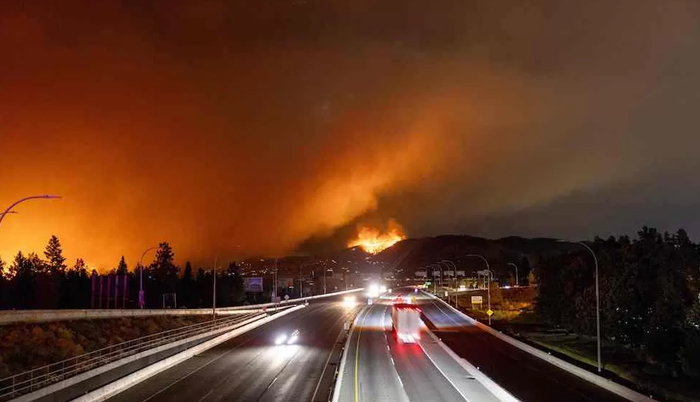![]() Home > America
Home > America
West Kelowna Fires: 'We Want To Go Home And Find Out What's Still There'

GETTY IMAGES | The McDougall Creek wildfire burns in the hills of West Kelowna
![]() August 24th, 2023 | 09:48 AM |
August 24th, 2023 | 09:48 AM | ![]() 744 views
744 views
UNITED STATES
Wildfires have ravaged much of western Canada and some of the hundreds of people displaced have been telling the BBC their fears over what may have been destroyed.
There was a rare sight in the sky over the Canadian twin towns of Kelowna and West Kelowna on Tuesday - the Sun.
For much of the last week the immediate area around Lake Okanagan, in the province of British Columbia, has been shrouded in thick smoke.
The direct result of hundreds of nearby wildfires, the smoke not only hampered the efforts of firefighters to locate and extinguish seats of fire, it also became a worrisome health hazard.
Among those concerned about air quality and particularly its impact on his six-month-old daughter Elizabeth was Shane - a resident of West Kelowna, queuing patiently to register at the ice-hockey rink-cum-crisis centre on the edge of the town.
Thankful that the Sun had poked its head through the clouds, alleviating at least one of his worries, Shane had other concerns.
"Friday afternoon, we were evacuated," he says as he waits hopefully in line to hear if he can qualify for emergency accommodation.
"It's tough being at my mother-in-law's because there's no room for me, my fiancé, the kids and the pets. We just keep looking for updates when we can go home and know if everything is still there!"
British Columbia Premier David Eby descended on a civic-run crisis centre after flying in a helicopter over the ravaged countryside surrounding Kelowna.
Full of praise for firefighters continuing to tackle hundreds of small blazes, Mr Eby said their efforts had saved dozens of homes and businesses in the area.
At a press conference overlooking the gradually improving vista of the Lake and its twin towns, Mr Eby responded to a question from the BBC about the underlying causes of so many wildfires across western Canada this year.
He was unequivocal, speaking as helicopters - able to fly again after the smoke had lifted - doused newly emerging fires.
"The ferocity of the fires and the extent of the burning, not just here in British Columbia but in Greece, Nova Scotia and the United States, are devastating fires clearly linked to human-caused climate change."
He continued: "Our Wildfire Service now has to work year-round because the fire season starts longer and goes on later. We're in the fourth year of drought here in BC, that's making the fires so much worse."
The devastating wildfires of the last week - more than 1,000 in total - have been some of the worst in Canada's history.
Firefighting services have been stretched to the limit, huge swathes of land have been consumed by flames and thousands have fled for their lives.
Among those evacuated, in haste and chaos, was local businessman Todd Ramsay.
Now safe with his family and pets in Vancouver, he described how one of the region's biggest lakes, 2.5km wide in places, was no barrier to the blaze.
"Nobody thought that the fire would jump across the lake," says Todd as he recalls the sudden realisation that homes on the "safe" eastern side of Lake Okanagan were also in peril.
"We were sitting on the deck and we could hear what sounded like hail and there were pine cones and pine needles and big chunks of carbon that were still warm falling down on our deck."
Luck has played its part - some residents and businesses left sprinklers or hoses on to try and save their properties.
But across the region, hundreds of buildings have been consumed by the fires, although it's a testament to the emergency workers dedication and experience that no lives have been lost.
The reason for so many wildfires this summer will be debated - but many, like Premier Eby, insist that climate change has to be a factor.
The almost apocalyptic scenes the residents of British Columbia people have witnessed in recent days are almost certain to become a more regular feature of life in these parts.
Source:
courtesy of BBC NEWS
by Wyre Davies | BBC News, West Kelowna, British Columbia
If you have any stories or news that you would like to share with the global online community, please feel free to share it with us by contacting us directly at [email protected]